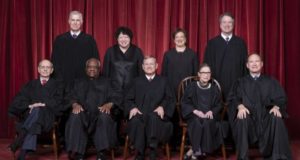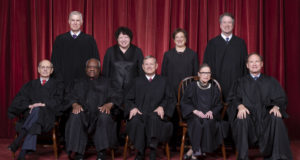The United States presidential election of 2016 will be analyzed for decades if not centuries. Most of that analysis will concentrate on the two candidates, and their respective campaigns and supporters.
But as far I am concerned, one of the greatest tragedies of the election was entirely attributable to the Republican-controlled Senate. I am speaking, of course, of the Chamber’s refusal to consider President Obama’s nomination of Merrick Garland to the Supreme Court (“SCOTUS”). As a result of this refusal of the Senate to act, the Court will remain short-handed for over a year. But even more importantly, a precedent has been set to refuse to even consider a judicial nominee for blatantly political reasons.
The State of Affairs — and Its Causes
It must be acknowledged that judges of SCOTUS are to be confirmed with the “advice and consent” of the United States Senate. So the Senate’s failure to act was not illegal per se. But it is now clearer than ever that the Court has become a politicized institution. As Noah Feldman has recently observed, there are no longer any apparent political costs in waiting for an election to consider a judicial nominee. This could lead the Senate to refuse to fill vacancies for at least two, if not four, years.
Why is this a problem? Well, first, it means SCOTUS will have to operate short-handed for lengthy periods of time. But second, and more importantly, it creates the perception that judges are partisan officials. The rule of law rests of the presumption of judicial impartiality. And lifetime tenure can only go so far to ensuring that presumption exists in the case of a blatantly political appointments process.
The Democrats are partially responsible for this state of affairs. As Professor Feldman has noted before, the refusal to confirm Robert Bork in 1987 was perhaps the first rejection of a SCOTUS nominee for purely ideological reasons. No one could question Judge Bork’s intelligence, qualifications, or character. While the Senate had refused to confirm other other nominees in the past century, they were almost always due to questionable character (John Parker, Abe Fortas, Clement Haynsworth, Harrold Carswell).
But in the case of Judge Garland, the Republicans went one step further. Garland was likely to be as ideologically acceptable a nominee as possible to Republicans from a Democratic president. Instead, the Republicans gambled that they would retake the White House and get an even more acceptable nominee. The gamble paid off, but at a huge cost.
It should be noted that nominees were rejected early in the first century of SCOTUS’s history for apparently no reasons other than politics and/or ideology. But most of these were in the two decades prior to, and the first decade after, the Civil War (particularly in the presidencies of John Tyler, Millard Fillmore, and Ulysses S. Grant). The political atmosphere of that period of US history is not one to be celebrated or emulated.
How to Move Forward?
So how should things move forward? I have two ideas.
First, the Senate should recognize the President has the constitutional authority to appoint judges and should not be investigating judges’ ideology. Instead, the Senate should seek to satisfy itself that a prospective judge is qualified and of good character. If a judge is qualified and of good character, the Senate should confirm a nominee. Rejections such as Bork and Garland should become taboo.
Having the Senate move in this direction will require a “culture shift”, however. And that culture shift is unlikely to occur unless something else happens. That is my second suggestions — the judiciary should not be overturning the will of the people except in clear cases. There are many defences of “judicial restraint” — that is, principled deference to the elected representatives of the people. But one of them is surely that, if judges do not uphold laws passed by the elected representatives of the people, the elected representatives of the people will seek to craft a judiciary in their own image. The rule of law requires judicial review to ensure the division of powers, federalism and, yes, individual rights, are protected. But SCOTUS’s has increasingly weighed into historically political matters in the past several decades. Both “conservative” and “progressive” causes have found themselves unexpectedly vindicated at SCOTUS in this time period. The elected representatives of the people were questionably overturned.
I could imagine a situation where a vacancy occurs late in term for political reasons — for instance, a judge could resign because his or her party has either lost or is on the verge of losing the White House. Such a situation arguably would justify Senate inaction as the judge has created the problem. But if the culture shift for which I am hoping occurs, such situations will be rare.
In January, Merrick Garland will resume sitting as Chief Judge of the Court of Appeals for the District of Columbia Circuit. He deserved better. And so does SCOTUS.
 Advocates for the Rule of Law
Advocates for the Rule of Law



